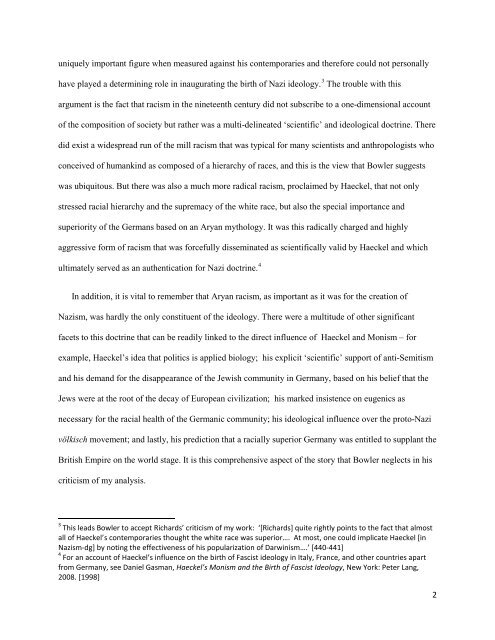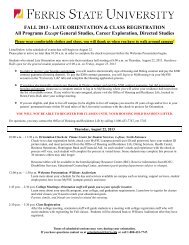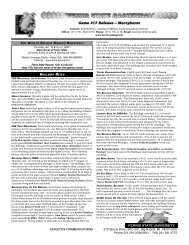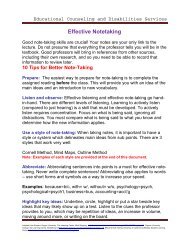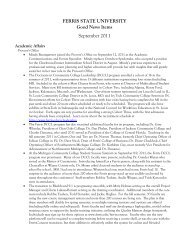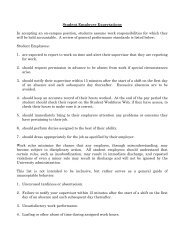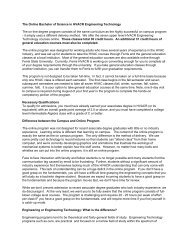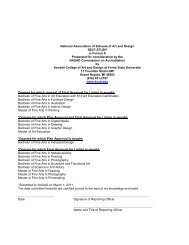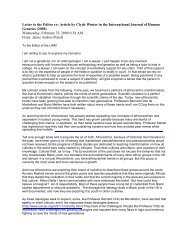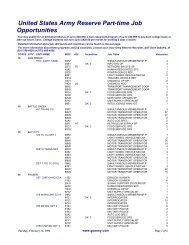Daniel Gasman - Ferris State University
Daniel Gasman - Ferris State University
Daniel Gasman - Ferris State University
Create successful ePaper yourself
Turn your PDF publications into a flip-book with our unique Google optimized e-Paper software.
uniquely important figure when measured against his contemporaries and therefore could not personally<br />
have played a determining role in inaugurating the birth of Nazi ideology. 3 The trouble with this<br />
argument is the fact that racism in the nineteenth century did not subscribe to a one-dimensional account<br />
of the composition of society but rather was a multi-delineated ‘scientific’ and ideological doctrine. There<br />
did exist a widespread run of the mill racism that was typical for many scientists and anthropologists who<br />
conceived of humankind as composed of a hierarchy of races, and this is the view that Bowler suggests<br />
was ubiquitous. But there was also a much more radical racism, proclaimed by Haeckel, that not only<br />
stressed racial hierarchy and the supremacy of the white race, but also the special importance and<br />
superiority of the Germans based on an Aryan mythology. It was this radically charged and highly<br />
aggressive form of racism that was forcefully disseminated as scientifically valid by Haeckel and which<br />
ultimately served as an authentication for Nazi doctrine. 4<br />
In addition, it is vital to remember that Aryan racism, as important as it was for the creation of<br />
Nazism, was hardly the only constituent of the ideology. There were a multitude of other significant<br />
facets to this doctrine that can be readily linked to the direct influence of Haeckel and Monism – for<br />
example, Haeckel’s idea that politics is applied biology; his explicit ‘scientific’ support of anti-Semitism<br />
and his demand for the disappearance of the Jewish community in Germany, based on his belief that the<br />
Jews were at the root of the decay of European civilization; his marked insistence on eugenics as<br />
necessary for the racial health of the Germanic community; his ideological influence over the proto-Nazi<br />
völkisch movement; and lastly, his prediction that a racially superior Germany was entitled to supplant the<br />
British Empire on the world stage. It is this comprehensive aspect of the story that Bowler neglects in his<br />
criticism of my analysis.<br />
3 This leads Bowler to accept Richards’ criticism of my work: ‘[Richards] quite rightly points to the fact that almost<br />
all of Haeckel’s contemporaries thought the white race was superior…. At most, one could implicate Haeckel [in<br />
Nazism-dg] by noting the effectiveness of his popularization of Darwinism….’ [440-441]<br />
4 For an account of Haeckel’s influence on the birth of Fascist ideology in Italy, France, and other countries apart<br />
from Germany, see <strong>Daniel</strong> <strong>Gasman</strong>, Haeckel’s Monism and the Birth of Fascist Ideology, New York: Peter Lang,<br />
2008. [1998]<br />
2


